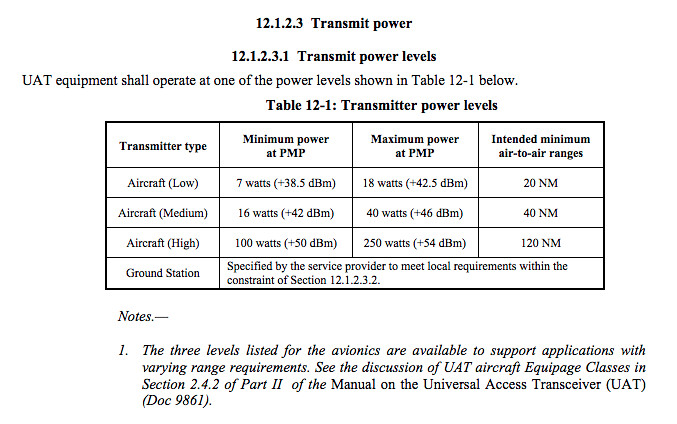

 |
 |
|
|
|
#1
|
|||
|
|||
|
Would anyone know what output power ADSB transmitters have for different size planes/craft?
Would anyone have photos of what the antennas look like that are used on the planes/craft? |
|
#2
|
|||
|
|||
|
Would be a lot of variables, type of aircraft, type of ADS-B transponder, the manufacturer, antenna used and where it's placed. Example is VH-KNS, which I could only pick-up once it was
 http://www.ads-b.com/PDF/UAT%20SARP.pdf https://www.google.com.au/search?q=a...w=1295&bih=655
__________________
Robert Myers Photography - Aviation Spotting Australia Flightradar24 feeder (F-YSWG1 & T-YSWG2) FlightAware feeder (YSWG/6482) |
|
#3
|
|||
|
|||
|
Robert,
Thank you for the info. I plugged into Google after reading your info and found some info here - https://www.hindawi.com/journals/ijno/2011/973656/ Not sure how accurate that is or where its from. But it would appear from your info and this, that small craft at low altitudes and speeds could be rather low powered yet the bigger planes could pack quite a hefty signal if the maximum limit is 500W. We could pressume that most larger planes would be TXing 100 to 125W as a minimum. Quote - "The ES ADS-B message is a 120 bit transmission that contains the aircraft identification, position, velocity, and status. The message is broadcast with a period that ranges randomly between 0.4 and 0.6 seconds. This randomization function is designed to prevent aircraft from having synchronized transmissions on the same frequency, and thus obscuring each other's transmissions. Required transmitter power for the ADS-B signal varies with the aircraft category. For smaller aircraft, a minimum transmission power of 75 W is specified while larger aircraft require a minimum power of 125 W or 200 W with a maximum output power for all classes of 500 W [6]. Any aircraft that is capable of operating at altitudes greater than 15,000 ft (4570 m) above sea level (ASL), or with cruising speeds above 175 kts (324 km/h), are required to transmit at 125 W as a minimum [6]. Aircraft use a quarter-wave monopole antenna for ADS-B transmissions that transmit vertically polarized signals [6]. |
 |
|
|